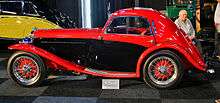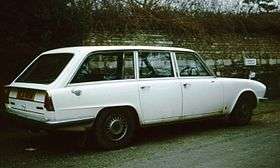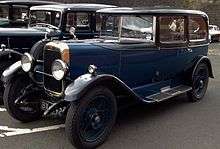Carbodies
Carbodies Limited is a British company, based at Holyhead Road, Coventry. It started business as a coachbuilder, and now, as The London Taxi Company is best known for its production of London taxicabs.
History
The business began in 1919, when Robert 'Bobby' Jones, a former general manager at coachbuilder Hollick and Pratt took over the coachbuilding operations of his then employer, timber merchants Gooderhams and set up in business in premises acquired from Thomas Pass in West Orchard, Coventry.[1]
Standardised Coachwork

Rather than make bespoke bodies to individual designs, Carbodies set out to produce coachwork to a number of standardised designs for car companies that did not have their own coachbuilding facilities. Their first major customers during the 1920s were MG and Alvis Cars. The scale of a new contract to build bodies for the MG M-Type Midget meant that they needed larger premises and in 1928, they moved to a larger site on Holyhead Road, where they remain to this day. In the 1930s, they supplied bodies for Rover, Invicta and Railton, but by far their biggest and most important customer in that decade was the Rootes Group.
During World War II the company made bodies for military vehicles. They also acquired press tools through the Lend-Lease scheme, which enabled them to make aircraft components. Carbodies also became a limited company at this time, with Bobby Jones as governing director and his son, Ernest Jones managing director.
Taxicabs, Convertibles, Daimlers and other Postwar Vehicles
After the war Carbodies negotiated with London taxi dealer Mann & Overton and Austin to make bodies for the Austin FX3 taxi as well as finishing and delivering the complete vehicles. They also developed a system for turning modern all-steel saloon cars into convertibles. This work was carried out on the early unit construction Hillman Minx, the Austin Somerset and Hereford, the Ford Mk1 Consul and Zephyr and, later the Mk2 Ford Consul, Zephyr and Zodiac.
In 1954, Bobby Jones sold Carbodies to the BSA group, who put it under the control of their prestige car company, Daimler. Although it was intended for Carbodies to become the manufacturing plant for Daimler steel bodies, this was never fulfilled. They did, however convert the Conquest saloon into a drophead, using the same methods they used on Fords and Austin and also made a drophead coupe body for the Daimler Conquest Roadster and made bodies for the Daimler Majestic and Majestic Major saloons.
Under BSA, manufacturing facilities were extended and more plant installed. In 1958, Carbodies began manufacturing the body and carrying out the assembly, finishing and delivery of the most important vehicle in their history, the Austin FX4 taxi. Carbodies also supplied prototype bodies and tooling, projects including the Jaguar E-type bonnet and panels for Triumph, Ariel and BSA motorcycles and scooters.
Further contracts undertaken during the 1960s and early 1970s were the conversion of Humber Hawk and Super Snipe, Singer Vogue and Triumph 2000 saloons into estate cars, but gradually, as contract work on private cars and commercial vehicles fell away, the FX4 taxi would become more important for the company.
Manganese Bronze Holdings Plc and London Taxis International
In 1971 Carbodies bought the FX4 chassis assembly line from British Leyland's Adderley Park, Birmingham factory and moved it to Coventry, making them complete manufacturers of the FX4, in actuality if not in name.[2] Two years later, Carbodies was bought, along with parent company BSA by Manganese Bronze Holdings.[3]
In the 1970s, Carbodies tried to make a new taxi of their own, the FX5, but it was abandoned in 1979 because the development costs were too high. 1982 saw Carbodies take responsibility for the complete manufacture of the FX4 taxicab, when British Leyland had finally lost interest in it.[4] By this time, the FX4 was the company's only product, despite attempts to introduce new lines, such as a Ford Cortina MkV convertible and the Range Rover Unitruck. A new model of taxi, the CR6, based on a Range Rover bodyshell was abandoned after almost five years of development.
In 1984, the London taxicab dealer Mann & Overton was bought by Manganese Bronze Holdings Plc. This acquisition resulted in the formation of London Taxis International, comprising LTI Carbodies, LTI Mann and Overton and London Taxi Finance.
In 1997, a new model of taxicab, the TX1 was introduced. This was updated as the TXII in 2002, and in 2007 as the present model, the TX4. This series has established LTI Vehicles as a worldwide supplier of London-type taxis.
In 1998 the name Carbodies Limited was dropped and the company was renamed LTI Limited and re-branded to The London Taxi Company in Nov 2010. In recent times The London Taxi Company set up a partnership with Chinese car maker Geely Automotive, building a factory in Shanghai to manufacture London taxis for the export market and to supply components to the home factory in Coventry. In 2010 the name Mann & Overton was dropped and the dealership now also trades as The London Taxi Company.
Gallery
Carbodies' MGs


 MG 18/80 Mark II Coupé
MG 18/80 Mark II Coupé


_ret.jpg)



 MG Magnette
MG Magnette
'Airline' Coupé MG Midget TA
MG Midget TA
'Airline' Coupé
Carbodies' prewar sports bodies
Carbodies' postwar drophead coupés and estate cars
 Ford Zephyr convertible
Ford Zephyr convertible Ford Consul convertible
Ford Consul convertible Consul MkII convertible
Consul MkII convertible Zephyr MkII convertible
Zephyr MkII convertible Alvis TA 14 drophead coupé
Alvis TA 14 drophead coupé Austin Somerset drophead coupé
Austin Somerset drophead coupé Triumph 2000 Estate
Triumph 2000 Estate Singer Vogue Estate
Singer Vogue Estate Humber Hawk Estate
Humber Hawk Estate Humber Super Snipe Estate
Humber Super Snipe Estate
Carbodies' Daimlers
 Daimler Conquest drophead coupé
Daimler Conquest drophead coupé_Century_drophead_coupe_(2011-03-23)_01.jpg) Daimler Conquest Century Roadster Drophead Coupé 1955-1957
Daimler Conquest Century Roadster Drophead Coupé 1955-1957
 Daimler Conquest Century Drophead Coupé
Daimler Conquest Century Drophead Coupé
Carbodies' taxis, hire cars and commercial vehicles
 Austin K8
Austin K8- Austin taxicab FX3
 Carbodies taxicab FX4
Carbodies taxicab FX4 Austin FX4 1962
Austin FX4 1962 1965 Austin FL2 Hire Car
1965 Austin FL2 Hire Car Austin FX4Q taxi 1985
Austin FX4Q taxi 1985 1990 Carbodies Fairway in Guinness livery
1990 Carbodies Fairway in Guinness livery 1995 Carbodies Fairway 95 London taxi
1995 Carbodies Fairway 95 London taxi TX1 London taxi in Switzerland
TX1 London taxi in Switzerland TX4 London taxi in Singapore
TX4 London taxi in Singapore
| Wikimedia Commons has media related to Carbodies Coachwork. |
References
- Bill Munro, Carbodies: The Complete Story, Crowood, UK 1998, ISBN 978-1-86126-127-4
- London Taxi Company press releases
- ↑ David Thoms, Tom Donnelly, The Motor Car Industry in Coventry since the 1890s Croom-Helm 1985 ISBN 0-7099-2456-9
- ↑ BSA assemble taxis The Times, Wednesday, 12 May 1971; p. 18; Issue 58170; col F
- ↑ MBH to buy taxi group The Times, Wednesday, 11 April 1984; p. 20; Issue 61803; col F
- ↑ Manganese Bronze boosted by exports The Times, Tuesday, 14 February 1984; p. 20; Issue 61757; col D


